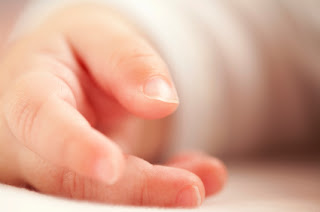Every Child a Caroline & Other Possibilities
“A baby is God’s opinion that the world should go on.”
— Carl Sandburg, poet
That her mother is named Sarah, that we passed a row-house yard where a single viburnum bush flamed red and orange in late October light, puts me in a biblical miracle kind of mood. I’m a bit wonky from jet lag and lack of sleep and lots of listening and thinking. I’m in Richmond, Virginia, two days into a four-day quarterly gathering of fund-raisers working on behalf of children under the umbrella of ChildFund International.
Wonky, yes, and suddenly anything seems possible. I look around the baby room, one chamber in a stately old home turned daycare center. The room is vintage but full of color, toys awaiting play, the murmuring voices of caregivers tending to their pint-sized clients. There are tall, old windows and small, new faces to look through them. A micro-world nested within a macro-world. The toddler in the corner watches dust motes in a sunbeam, and it seems plausible that she is working out her own theory of relativity.
Beauty flickers from the edges of everything, weedy and persistent, this moment a crack in the sidewalk, a pause in the day, which always wants to move you forward to something else. It seems reasonable to expect flowers, purple lupine or orange poppies, to sprout from a toppled toy truck or the stray baby shoe abandoned in the middle of a rug. Okay, maybe we’re not talking world peace by midnight or the abolishment of political ads, but it does seem possible that happiness is the natural order of things, that if you extend your awkward hands into air, you’ll discover how incredible they are, how enough you are.
It’s approaching 6 p.m., so only a few babies and toddlers remain to be retrieved by parents. There’s an infant cradled in a half-donut-shaped beanbag, safe yet with the illusion of independence—babies like that—and he, or is it she?, is studying the ceiling with grey-blue glossy eyes. Infant eyes always remind me how otherworldly we are in the beginning, aliens landed, dazzled by the ordinary.
One drooly little guy, a tiny drunken sailor, staggers and lurches my way. He grabs my trouser leg for balance, looking up at me, smiling, all wet gums and nubs of new teeth. He tips his head back and lets his mouth fall open, stringy globs of drool landing on my shoe, as he stares way up. He’s heard, perhaps, I’m from redwood country. To him, I’m a redwood full of ravens he’s trying to spot without binoculars.
Caroline examines Sarah’s face, considering her options: Do I give my Mum my dumbfounded, merry, you-are-the-love-of-my-brief-life face, or do I squeal and scowl at my caregiver dressing my bottom? I realize this is the decision on which the world always hangs: to smile or to snarl? How any of us answer that question is a tipping point—away from or toward—war, divorce, a lousy day or a good one.
Sarah, my colleague whom I only slightly know, talks coo-y—not baby talk, which babies find annoying, yet not the professional tone she used during our meetings today. She leans her face into the milky perfume of Caroline’s breath, “Hel-lo Car-o-line!” Sarah’s voice is reassuring and vulnerable at the same time, a blend of I-want-everything-for-you and I-know-I-can’t-protect-you-from-life.
 For some reason, I whistle at Caroline. She gapes and grins. She thinks I am a musical genius, another Wynton Marsalis, or one of Lady Gaga’s back-up singers. She’s teething, though, so maybe she’s only estimating whether she can fit some part of me into her mouth, my nose or earlobe, a bit of cheekbone to gnaw.
For some reason, I whistle at Caroline. She gapes and grins. She thinks I am a musical genius, another Wynton Marsalis, or one of Lady Gaga’s back-up singers. She’s teething, though, so maybe she’s only estimating whether she can fit some part of me into her mouth, my nose or earlobe, a bit of cheekbone to gnaw.
This feeling keeps washing over me, sublime possibility. Autumn light floats through the windows at a low angle, the room glowing amber, the day not yet done. Then this thought: Caroline is a sample. One of her own hands now stuffed in her jaws, feet kicking with joy to be lifted into her mother’s arms, her moony face finding the singular curve of Sarah’s neck, it hits me: Caroline is how it’s supposed to be for all children.
It’s an accident that I am here in the baby room with Sarah and Caroline and my sailor buddy still hanging on to me and a few other crawly humans. I missed a ride with another colleague to dinner so Sarah invited me to tag along with her, if I didn’t mind stopping to pick up Miss Caroline. The reward is a free shoe shine—baby drool really brings out the luster of leather—and this unexpected wave of possibility.
It’s been four months since I returned to ChildFund to work with Sarah and others in building the fund-raising program. It’s about relationships, finding and connecting with people who want to change the lives of children as much as we do. Among our priorities is enabling ChildFund to expand its early childhood development programs that already touch millions of children in 31 countries. The good news is that the humanitarian field and my organization are indeed saving the lives of children and their mothers in some of the poorest, once-ignored places. Now it’s time to move more children beyond surviving to thriving.
 |
My first sponsored child,
Elivra,
with her abuelita (grandma)
in the Bolivian altiplano
|
It’s time to go. Caroline is simultaneously fingering Sarah’s hair while cocking her head to listen as I fawn over her, tell her how smart she is, ask her if she’s hungry. She replies in her baby Slavic, “Nyaat!” The tiny sailor below, losing his battle with gravity, lets go of my calf and plops down on the floor to sit and hold his foot. I can tell by his serene focus that his foot is utterly fascinating.
In the car, I want to curl up on the back seat, lay my cheek near Caroline, and just watch her be happy baby, and take a nap together. But I stick to the script and assume my role as a proper adult in the front passenger seat. As house after house blurs by as we drive, I consider the more than 7 billion people who now inhabit our planet, how lots of them are babies, children, vulnerable young people whose lives are lived mostly in anonymity. It’s easier to feel hopeless than to believe in possibility, but then, easy is overrated.
Out of the blue, I’m homesick for my cats. I decide its completely doable that I’ll teach them to catch Frisbees at Clam Beach when I return, my mid-life body turning to muscle instead of bread dough as I fling the plastic disc over sand, marveling at their feline leaping, the nice hook my boy will put on the return toss. I glance back at Caroline. She’s asleep in her car seat, her head bent to shoulder as if a swan resting beak to wing. Every child a Caroline.







Kimberley, what a beautiful story. Thank you for sharing and helping me to better understand the GREAT work that Child Fund is doing!
ReplyDelete